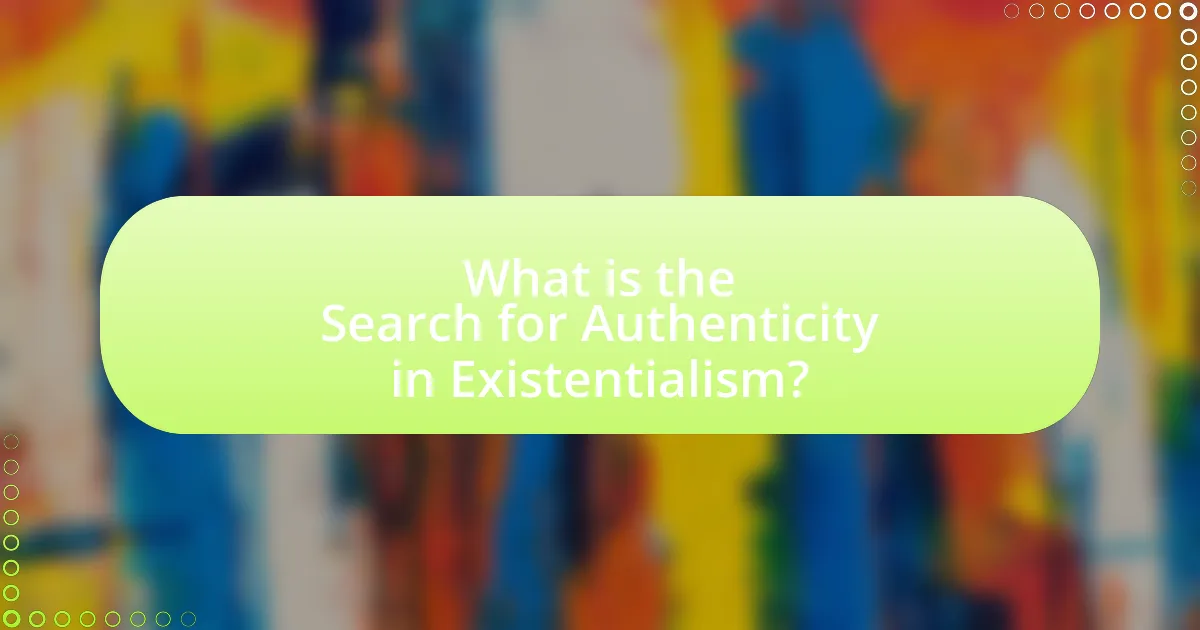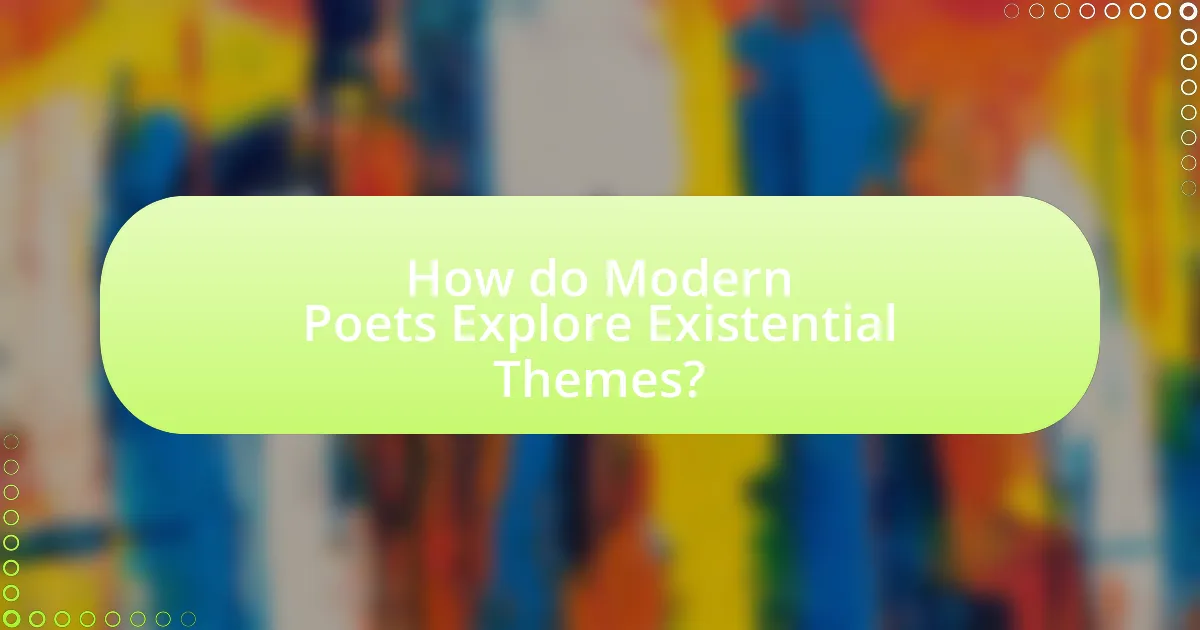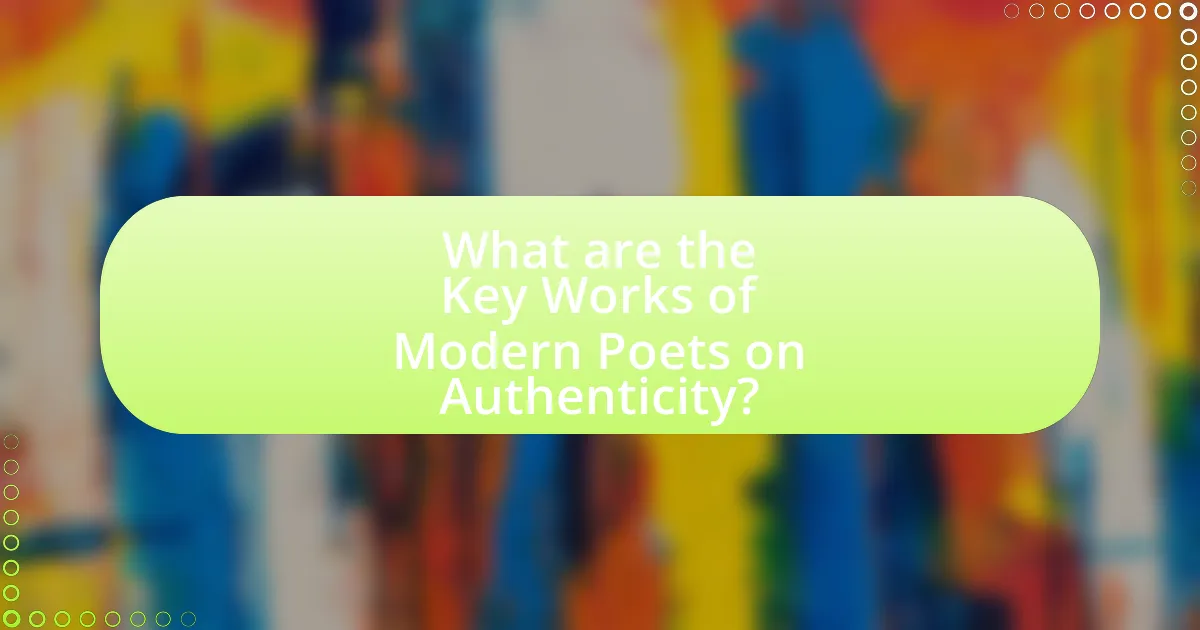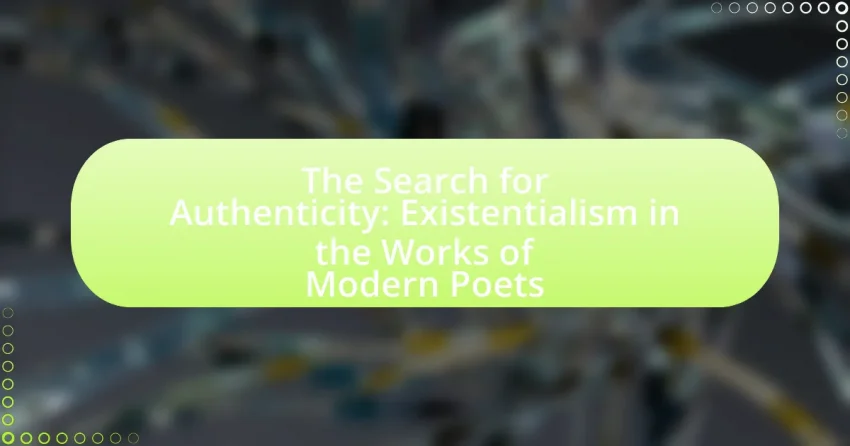The article examines the search for authenticity within existentialism, highlighting the philosophical foundations laid by thinkers like Jean-Paul Sartre and Martin Heidegger. It explores how modern poets interpret and express authenticity through personal narratives, emotional truth, and the rejection of societal norms, with examples from influential figures such as Sylvia Plath and Ocean Vuong. The discussion includes the significance of individual experience in defining authenticity, the existential themes present in contemporary poetry, and the literary techniques that enhance these explorations. Ultimately, the article underscores the importance of authenticity in both existential philosophy and modern poetic expression.

What is the Search for Authenticity in Existentialism?
The search for authenticity in existentialism refers to the quest for genuine self-identity and personal truth in a world perceived as absurd or indifferent. Existentialist philosophers, such as Jean-Paul Sartre and Simone de Beauvoir, argue that individuals must confront their freedom and responsibility to create meaning in their lives, thereby achieving authenticity. This concept emphasizes the importance of living in accordance with one’s true self rather than conforming to societal expectations or external pressures. Sartre’s notion of “bad faith” illustrates how individuals often deceive themselves to escape the anxiety of freedom, highlighting the necessity of embracing one’s authentic existence.
How do modern poets interpret the concept of authenticity?
Modern poets interpret the concept of authenticity as a profound exploration of individual identity and genuine expression. They often emphasize the importance of personal experience and emotional truth, reflecting a shift from traditional poetic forms to more experimental styles that prioritize the voice of the self. For instance, poets like Ocean Vuong and Claudia Rankine utilize personal narratives and cultural contexts to convey authenticity, challenging societal norms and expectations. This approach aligns with existentialist themes, where the quest for authenticity becomes a central concern, as seen in the works of poets who grapple with their own existence and the complexities of modern life.
What philosophical foundations support the idea of authenticity in existentialism?
The philosophical foundations that support the idea of authenticity in existentialism are primarily rooted in the works of philosophers such as Jean-Paul Sartre and Martin Heidegger. Sartre posits that authenticity involves embracing one’s freedom and responsibility, asserting that individuals must create their own essence through choices, as articulated in his work “Existentialism is a Humanism.” Heidegger emphasizes the concept of “Being” and the importance of confronting one’s own existence, suggesting that authenticity arises from an individual’s awareness of their own mortality and the choices that define their being, as discussed in “Being and Time.” These foundational ideas underscore the existential belief that authenticity is achieved through self-awareness, personal choice, and the acceptance of one’s unique existence in a seemingly indifferent universe.
How does the search for authenticity manifest in poetic expression?
The search for authenticity in poetic expression manifests through the exploration of personal truth, emotional honesty, and the rejection of societal norms. Modern poets often delve into their inner experiences, using vivid imagery and raw language to convey genuine feelings and thoughts. For instance, poets like Sylvia Plath and Allen Ginsberg exemplify this pursuit by articulating their struggles with identity and societal expectations, thereby creating a connection with readers who resonate with their candidness. This authenticity is further reinforced by the use of free verse and unconventional structures, allowing poets to break free from traditional constraints and express their unique voices.
Why is authenticity significant in the context of existentialism?
Authenticity is significant in the context of existentialism because it represents the individual’s commitment to living a life true to oneself, free from societal expectations and external pressures. Existentialist philosophers, such as Jean-Paul Sartre and Simone de Beauvoir, emphasize that authenticity is essential for personal freedom and self-definition. Sartre posits that individuals must confront the “absurd” nature of existence and make choices that reflect their true selves, rather than conforming to predefined roles. This notion is supported by de Beauvoir’s assertion that one must embrace their freedom and responsibility to create meaning in an indifferent universe. Thus, authenticity serves as a foundational principle in existentialism, guiding individuals toward genuine existence and self-realization.
What role does individual experience play in defining authenticity?
Individual experience is crucial in defining authenticity, as it shapes one’s perceptions, beliefs, and expressions of self. Each person’s unique life experiences contribute to their understanding of what is genuine or true, influencing how they convey their identity through art and poetry. For instance, modern poets often draw from personal narratives, reflecting their struggles, joys, and existential inquiries, which resonate with audiences seeking relatable authenticity. This connection between individual experience and authenticity is evident in the works of poets like Sylvia Plath and Rainer Maria Rilke, who embed their personal histories into their poetry, thereby creating a profound sense of authenticity that speaks to the human condition.
How does the quest for authenticity influence modern poetic themes?
The quest for authenticity significantly influences modern poetic themes by prompting poets to explore personal identity, emotional truth, and existential dilemmas. This exploration often manifests in themes of vulnerability, self-reflection, and the rejection of societal norms, as poets seek to express genuine experiences and emotions. For instance, contemporary poets like Ocean Vuong and Claudia Rankine emphasize the importance of personal narrative and lived experience, reflecting a broader cultural shift towards valuing authenticity in art. This trend aligns with the rise of confessional poetry, where the focus on the self and personal struggles serves as a means to connect with readers on a deeper level, thereby reinforcing the significance of authenticity in modern poetry.

How do Modern Poets Explore Existential Themes?
Modern poets explore existential themes by delving into the complexities of human existence, identity, and the search for meaning in a seemingly indifferent universe. They often utilize personal experiences, fragmented narratives, and vivid imagery to convey feelings of alienation, despair, and the quest for authenticity. For instance, poets like Sylvia Plath and T.S. Eliot reflect on the individual’s struggle against societal expectations and the inherent absurdity of life, as seen in Plath’s “Lady Lazarus” and Eliot’s “The Love Song of J. Alfred Prufrock.” These works illustrate the tension between personal desires and external pressures, highlighting the existential crisis faced by individuals. Through their innovative use of language and form, modern poets effectively capture the essence of existential thought, making their explorations both relatable and profound.
What existential questions do modern poets grapple with?
Modern poets grapple with existential questions such as the meaning of life, the nature of identity, and the inevitability of death. These themes reflect a deep exploration of human existence and the search for authenticity in a rapidly changing world. For instance, poets like Sylvia Plath and T.S. Eliot examine the fragmentation of self and the quest for purpose amidst societal pressures, illustrating how personal and collective experiences shape one’s understanding of existence. Their works often highlight the tension between individual desires and external expectations, emphasizing the struggle to find genuine self-expression in a complex reality.
How do these questions reflect the human condition?
These questions reflect the human condition by probing fundamental aspects of existence, identity, and meaning. Existentialism, as explored in modern poetry, often addresses themes such as isolation, the search for purpose, and the struggle against absurdity, which are intrinsic to the human experience. For instance, poets like T.S. Eliot and Sylvia Plath articulate feelings of disconnection and the quest for authenticity, illustrating how individuals grapple with their realities. This exploration is validated by literary analysis that shows how existential themes resonate with readers’ own experiences, highlighting the universal nature of these inquiries into the self and existence.
What poetic techniques are used to convey existential themes?
Poetic techniques used to convey existential themes include imagery, symbolism, and free verse. Imagery creates vivid mental pictures that evoke feelings of isolation and uncertainty, reflecting the human condition. Symbolism allows poets to represent abstract concepts, such as existence and meaning, through tangible objects or actions, enhancing the depth of existential inquiry. Free verse provides flexibility in structure, enabling poets to express fragmented thoughts and emotions that align with existential themes of chaos and ambiguity. These techniques effectively illustrate the complexities of existence and the search for authenticity in modern poetry.
In what ways do modern poets challenge societal norms?
Modern poets challenge societal norms through the exploration of identity, the questioning of traditional values, and the use of unconventional forms and language. By addressing themes such as gender, race, and mental health, poets like Ocean Vuong and Claudia Rankine confront societal expectations and provoke critical discourse. For instance, Vuong’s work often reflects on the immigrant experience and queer identity, dismantling stereotypes and inviting readers to reconsider preconceived notions. Additionally, Rankine’s “Citizen” employs a blend of poetry and prose to highlight racial injustices, effectively challenging the status quo. These approaches not only disrupt conventional poetic forms but also encourage readers to engage with complex social issues, thereby fostering a deeper understanding of authenticity in the human experience.
How does this challenge relate to the search for authenticity?
This challenge relates to the search for authenticity by highlighting the tension between societal expectations and individual identity. Modern poets often grapple with existential themes that question the nature of self and the authenticity of experiences in a world filled with external pressures. For instance, poets like Sylvia Plath and T.S. Eliot explore the dissonance between personal truth and societal roles, illustrating how this struggle can lead to a deeper understanding of one’s authentic self. Their works serve as a reflection of the broader existential inquiry into what it means to live authentically amidst conflicting influences.
What examples illustrate this challenge in contemporary poetry?
Contemporary poetry often illustrates the challenge of authenticity through the works of poets like Ocean Vuong and Claudia Rankine. Ocean Vuong’s collection “Night Sky with Exit Wounds” explores themes of identity and belonging, reflecting the struggle for genuine self-expression in a fragmented world. Claudia Rankine’s “Citizen: An American Lyric” confronts racial identity and societal perceptions, emphasizing the existential quest for authenticity amidst systemic oppression. Both poets utilize personal narrative and cultural critique to highlight the complexities of finding one’s voice in contemporary society.

What are the Key Works of Modern Poets on Authenticity?
Key works of modern poets on authenticity include “The Waste Land” by T.S. Eliot, “Howl” by Allen Ginsberg, and “The Collected Poems” by Sylvia Plath. T.S. Eliot’s “The Waste Land” explores themes of disillusionment and the search for meaning in a fragmented world, reflecting the struggle for authentic expression. Allen Ginsberg’s “Howl” confronts societal norms and personal identity, emphasizing the importance of genuine self-representation. Sylvia Plath’s “The Collected Poems” delves into personal experiences and emotional truths, showcasing the quest for authenticity in the face of societal expectations. These works collectively illustrate the existential pursuit of authenticity in modern poetry.
Which poets are most influential in the discourse of authenticity?
The poets most influential in the discourse of authenticity include Walt Whitman, Rainer Maria Rilke, and Sylvia Plath. Walt Whitman is renowned for his celebration of the self and individuality in works like “Leaves of Grass,” which emphasizes personal experience and authenticity. Rainer Maria Rilke’s “Letters to a Young Poet” explores the importance of inner truth and self-exploration, advocating for authenticity in artistic expression. Sylvia Plath’s confessional poetry, particularly in “The Bell Jar,” delves into personal identity and emotional honesty, contributing significantly to discussions on authenticity in literature. These poets have shaped the understanding of authenticity through their exploration of the self and personal truth in their works.
What themes do these poets commonly explore in their works?
Modern poets commonly explore themes of existentialism, identity, and the search for authenticity in their works. These themes reflect the human experience of grappling with existence, the quest for self-understanding, and the desire to live genuinely in a complex world. For instance, poets like T.S. Eliot and Sylvia Plath delve into the struggles of individual identity amidst societal expectations, illustrating the tension between personal truth and external pressures. Their works often highlight the emotional turmoil and introspection that accompany the search for meaning, reinforcing the significance of authenticity in navigating life’s uncertainties.
How do their personal experiences shape their poetic voice?
Personal experiences significantly shape a poet’s voice by influencing their themes, language, and emotional resonance. For instance, poets often draw from their life events, cultural backgrounds, and emotional struggles, which inform their perspectives and stylistic choices. This connection is evident in the works of poets like Sylvia Plath, whose experiences with mental illness and personal trauma deeply inform her confessional style, creating a raw and authentic voice. Similarly, Langston Hughes’s experiences as an African American in the early 20th century shaped his exploration of identity and social justice, resulting in a powerful, resonant poetic expression. These examples illustrate how personal experiences serve as a foundation for a poet’s unique voice, allowing them to convey authenticity and connect with readers on a profound level.
What specific poems exemplify existential authenticity?
Specific poems that exemplify existential authenticity include “The Love Song of J. Alfred Prufrock” by T.S. Eliot, “Do Not Go Gentle into That Good Night” by Dylan Thomas, and “The Waste Land,” also by T.S. Eliot. These poems explore themes of individual existence, the search for meaning, and the confrontation with mortality, which are central to existentialist thought. For instance, in “The Love Song of J. Alfred Prufrock,” the protagonist grapples with self-doubt and the passage of time, reflecting an authentic struggle with identity and purpose. Similarly, Dylan Thomas’s “Do Not Go Gentle into That Good Night” emphasizes the fight against death, showcasing a deeply personal and authentic response to existential fear. “The Waste Land” presents a fragmented view of modern life, capturing the disillusionment and search for meaning in a chaotic world, further illustrating existential authenticity.
How do these poems illustrate the struggle for authenticity?
These poems illustrate the struggle for authenticity by depicting characters grappling with societal expectations and personal identity. The poets use vivid imagery and introspective language to convey the tension between external pressures and the desire for self-expression. For instance, in works by modern poets like Sylvia Plath and Allen Ginsberg, themes of alienation and the quest for genuine selfhood are prevalent, showcasing the internal conflict faced by individuals in a conformist society. This struggle is often highlighted through metaphors that represent the dichotomy between the public persona and the private self, emphasizing the emotional turmoil that arises from the pursuit of authenticity.
What literary devices enhance the exploration of authenticity in these works?
Literary devices such as imagery, symbolism, and stream of consciousness enhance the exploration of authenticity in the works of modern poets. Imagery allows poets to create vivid representations of personal experiences, enabling readers to connect emotionally and understand the complexities of authenticity. For example, in the works of poets like Sylvia Plath, rich imagery conveys the internal struggles of identity and self-perception. Symbolism serves to represent deeper meanings and themes related to authenticity, as seen in the use of objects or actions that reflect the poet’s true self or societal expectations. Additionally, the stream of consciousness technique provides insight into the poet’s thoughts and feelings, revealing the raw and unfiltered aspects of their search for authenticity, as demonstrated in the writings of T.S. Eliot. These devices collectively contribute to a nuanced exploration of authenticity, allowing readers to engage with the existential themes present in modern poetry.
How can readers engage with the themes of authenticity in poetry?
Readers can engage with the themes of authenticity in poetry by reflecting on their personal experiences and emotions as they relate to the poems. This engagement allows readers to connect deeply with the poet’s voice and intentions, fostering a sense of shared humanity. For instance, modern poets like Rainer Maria Rilke and Sylvia Plath often explore the complexities of identity and self-expression, prompting readers to examine their own authenticity in the context of societal expectations. By analyzing the language, imagery, and emotional resonance in these works, readers can uncover layers of meaning that resonate with their own life experiences, thus enhancing their understanding of authenticity in the poetic form.
What strategies can be employed to analyze existential themes in poetry?
To analyze existential themes in poetry, one effective strategy is to examine the use of imagery and symbolism, as these elements often reflect the poet’s exploration of existence, identity, and the human condition. For instance, poets like T.S. Eliot and Sylvia Plath utilize vivid imagery to convey feelings of alienation and despair, which are central to existential thought. Additionally, analyzing the structure and form of the poem can reveal how the poet grapples with concepts of time, choice, and freedom, as seen in the fragmented structures of modernist poetry that mirror the chaos of existence. Close reading techniques, such as identifying key motifs and recurring themes, further enhance understanding of how poets articulate existential dilemmas. These strategies collectively provide a comprehensive framework for interpreting the complex layers of meaning associated with existentialism in poetry.
How can understanding these themes enrich the reading experience?
Understanding the themes of existentialism in modern poetry enriches the reading experience by providing deeper insights into the human condition and the quest for authenticity. This comprehension allows readers to connect emotionally with the struggles and dilemmas faced by the poets, fostering a more profound engagement with the text. For instance, themes such as isolation, freedom, and the search for meaning resonate with readers’ own experiences, making the poetry more relatable and impactful. Research indicates that readers who engage with thematic elements are more likely to experience increased empathy and critical thinking, enhancing their overall appreciation of literature.
